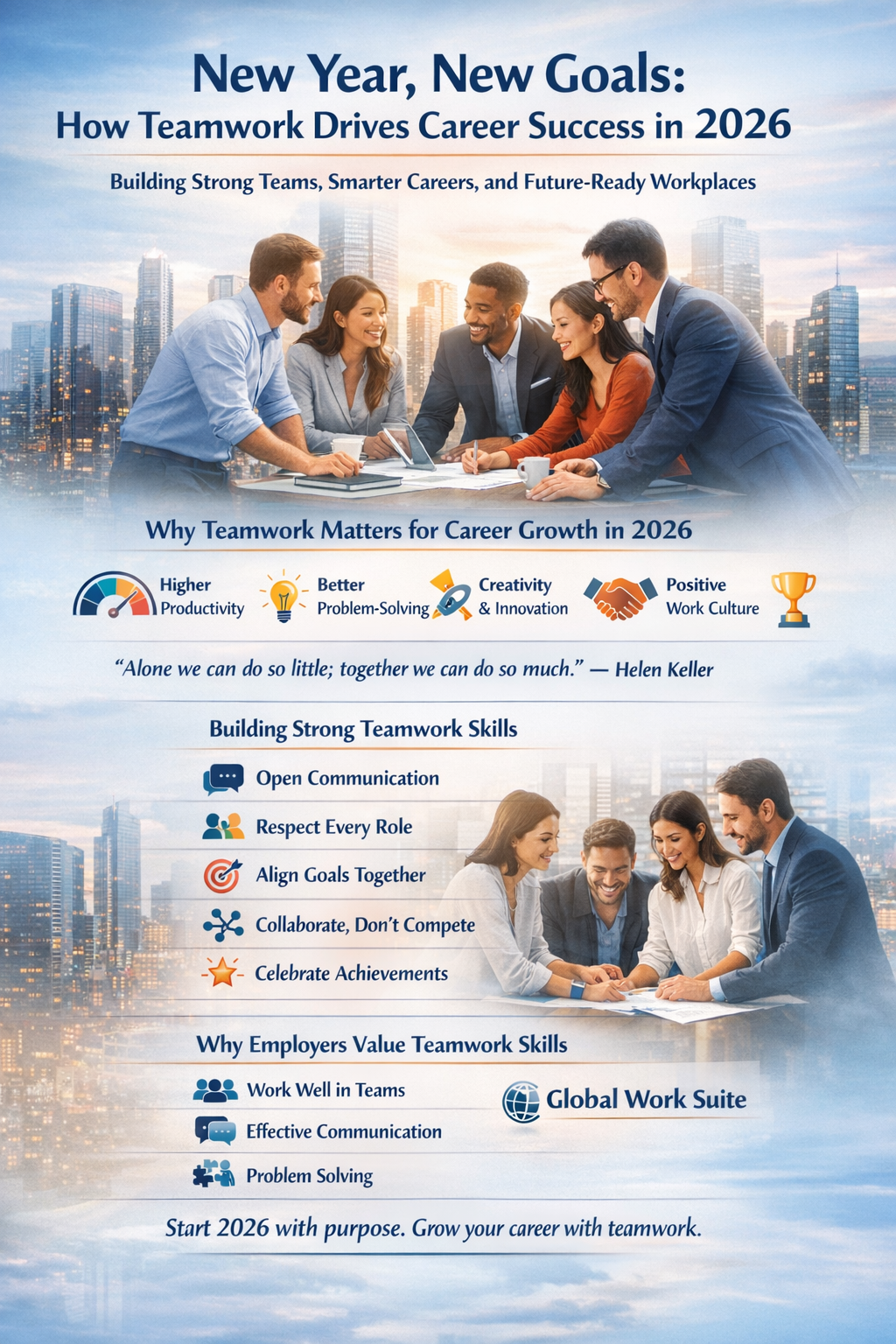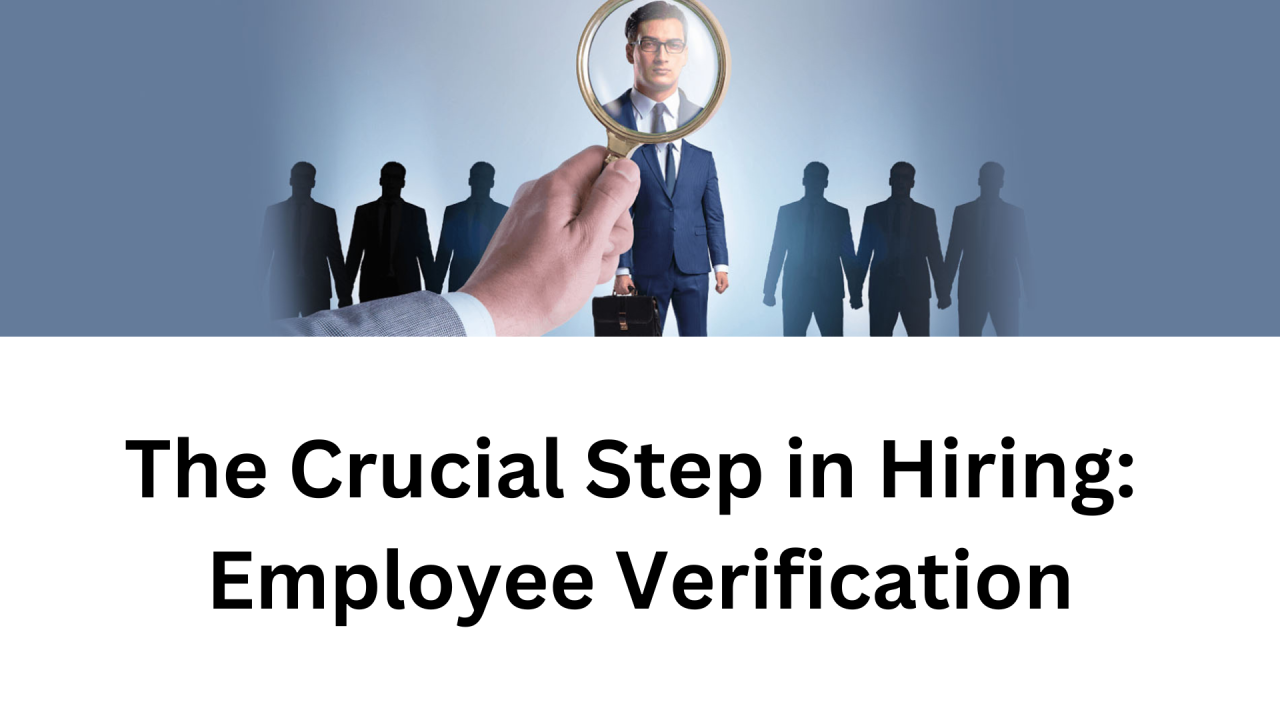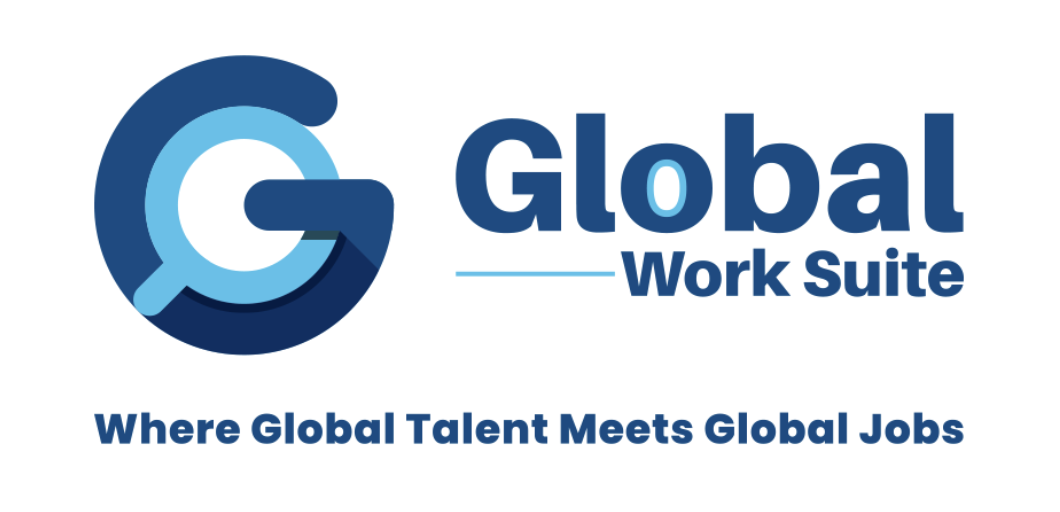See what's new with Global Work Suite
Explore blog posts

New Year, New Goals: How Teamwork Drives Career Success in 2026
Building Strong Teams, Smarter Careers, and Future-Ready Workplaces
As we enter 2026, professionals across industries are rethinking their career goals, workplace values, and growth strategies. The New Year is not just a reset — it’s an opportunity to build stronger careers through collaboration, teamwork, and meaningful professional connections.
In today’s competitive job market, career success in 2026 depends heavily on how well individuals collaborate, communicate, and contribute within teams. At Global Work Suite, we believe teamwork is not a soft skill — it is a strategic advantage.
Why Teamwork Is Essential for Career Growth in 2026
Teamwork in the modern workplace is about collaboration, shared accountability, and collective problem-solving. Organizations that prioritize teamwork consistently outperform those that operate in silos.
Key Benefits of Teamwork in the Workplace
• Higher Workplace Productivity
Teams divide responsibilities efficiently, improving performance and speed.
• Better Problem-Solving Skills
Diverse teams generate innovative and practical solutions.
• Increased Creativity and Innovation
Collaboration sparks ideas that drive business growth.
• Positive Workplace Culture
Trust, respect, and engagement strengthen employee satisfaction.
• Shared Professional Success
Collective wins boost morale and long-term motivation.
“Alone we can do so little; together we can do so much.” — Helen Keller
This principle defines high-performing teams and successful organizations worldwide.
How to Set Career Goals in 2026 Using Teamwork
The New Year is the ideal time to align individual career goals with team and organizational objectives. Professionals who collaborate effectively are more likely to advance faster and gain leadership opportunities.
5 Ways to Build Strong Teamwork Skills in 2026
1. Practice Open Communication at Work
Encourage transparency, feedback, and active listening.
2. Respect Every Team Role
Every contribution matters, regardless of title or position.
3. Align Personal and Team Objectives
Goal alignment improves focus and accountability.
4. Encourage Collaboration Over Competition
Knowledge-sharing leads to long-term career growth.
5. Celebrate Team Achievements
Recognition improves engagement and retention.
Developing these teamwork skills positions you as a valuable and future-ready professional.
Why Employers Value Teamwork Skills in Job Candidates
In 2026, employers are prioritizing candidates with strong collaboration and communication skills. Team-oriented professionals adapt faster and perform better.
Top Teamwork Skills Employers Look For
• Ability to work in diverse teams
• Effective workplace communication
• Collaborative problem-solving
• Knowledge sharing and adaptability
When applying for jobs, highlight team-based achievements in your CV and interviews to demonstrate real-world impact.
Teamwork and Career Development: The 2026 Advantage
Career growth is no longer about individual competition — it’s about collaborative success. Whether you are a job seeker, team leader, or working professional, teamwork accelerates learning, innovation, and professional fulfillment.
Strong teams build resilient careers and sustainable workplaces.
Build Your Career with Global Work Suite
Global Work Suite is a career and workforce solutions platform designed to connect professionals with the right jobs, companies, and collaborative teams.
With Global Work Suite www.g-worksuite.com you can:
• Discover new job opportunities
• Build meaningful professional connections
• Grow your career through collaboration
✨ Start 2026 with purpose. Grow your career with teamwork.
© 2026 Global Work Suite. All rights reserved. Credit : Ms. Phoo Myat Thwe ( Alora )

New Hiring & Staff Verification Process – How to Do It and Why It Is Crucial for Every Organization
In today’s fast-moving business world, hiring the right people is no longer just about filling positions — it’s about building a strong, trustworthy, and future-ready workforce. As companies scale and competition grows, organizations must ensure that each hire is not only qualified, but also verified, reliable, and aligned with company values.
At Global Work Suite, we emphasize the importance of a structured Hiring & Staff Verification Process that saves companies from risks, enhances productivity, and protects brand reputation.
✅ Why Staff Verification Is Crucial
1. Protects Your Company from Risks
Incorrect hires can lead to fraud, misconduct, or reputation damage. Verification ensures the person you bring on board is trustworthy.
2. Ensures Authenticity of Information
Many CVs contain inflated experiences or unverifiable claims. A verification process validates:
• Employment history
• Education & certifications
• Identity documents
• Criminal background (if applicable)
3. Improves Workplace Safety
Verified employees help maintain a safe, secure, and positive work environment.
4. Enhances Client Confidence
Businesses and clients trust companies that maintain a transparent and credible hiring system.
5. Supports Long-Term Stability
Hiring the right individual today reduces turnover, improves team performance, and supports future growth.
⭐ How to Conduct a Proper Hiring & Staff Verification Process
Step 1: Define the Job Clearly
Begin with a precise Job Description outlining:
• Responsibilities
• Skills required
• Behavioral expectations
• Salary range
A clear JD attracts the right candidates and avoids misalignment.
Step 2: Structured Application Screening
Shortlist candidates based on measurable criteria. Use applicant tracking systems (ATS) or platforms like Global Work Suite to manage and filter applications efficiently.
Step 3: Conduct Behavioral & Technical nterviews
Use a mix of:
• Competency-based questions
• Real-case problem scenarios
• Personality evaluation
This ensures a holistic assessment.
Step 4: Perform Background & Reference Checks
This is the most crucial stage. Verify:
• Past employers
• Education certificates
• NRC/Passport copies
• Police clearance (if needed)
• Social media behavior (professional conduct)
Step 5: Offer Letter & Documentation
After verification, issue:
• Offer letter
• Contract
• Policy acknowledgement forms
• NDA / Confidentiality agreements (if applicable)
Step 6: Onboarding & Orientation
Introduce the new employee to:
• Company culture
• Team members
• Work policies
• SOPs
• Training plan
Good onboarding boosts motivation and retention.
🌟 Why Choose Global Work Suite for Hiring & Verification?
At Global Work Suite, we empower businesses to hire smarter, faster, and more confidently through:
✔ Free job posting platform
✔ Automated screening & filtering
✔ Access to verified candidates
✔ Easy company profile visibility
✔ Dashboard for managing applicants
✔ Dedicated support for recruitment teams
Our mission is to provide organizations with the tools they need to build strong, credible, and future-ready teams.
Conclusion
The hiring and staff verification process is not optional — it is a critical part of building an organization that is secure, productive, and reputable. Companies that follow structured hiring practices experience lower turnover, smoother operations, and high-performing teams.
Global Work Suite makes it easier, smarter, and more efficient.
Additional Points for Effective Employee Verification Process
1. Resume Verification:
Cross-check information provided on the candidate's resume, including educational qualifications, employment history, certifications, and skills. Contact previous employers and educational institutions for verification.
2. Criminal Background Checks:
Conduct criminal background checks to ensure candidates have no relevant criminal history that might pose a risk to the workplace.
3. Reference Checks:
Contact provided references to gain insights into the candidate's character, work ethic, and performance. Seek specific examples of their past accomplishments and challenges.
4. Identity Verification:
Verify the candidate's identity through government-issued identification documents to confirm their legal status and eligibility to work.
5. Social Media Screening:
Check the candidate's social media profiles for any publicly available information that might be relevant to their suitability for the role.
6. Drug Testing:
In certain industries, conduct drug tests to ensure a drug-free workplace, especially for safety-sensitive roles.
7. Compliance with Regulations:
Ensure that the verification process complies with relevant local, state, and federal laws and industry-specific regulations.
8. Transparent Communication:
Communicate the verification process clearly to candidates, including what checks will be performed and how their data will be handled and protected.
9. Data Privacy:
• • Adhere to data privacy laws and protect candidates' personal information throughout the verification process.
📌 Copyright Notice
© 2025 Global Work Suite. All Rights Reserved.
No part of this article may be reproduced, copied, or distributed without written permission from Global Work Suite.

🧭 How to Prepare the Best CV and Apply for a Job with a Winning Cover Letter
🧭 How to Prepare the Best CV and Apply for a Job with a Winning Cover Letter
By Global Work Suite | www.g-worksuite.com
🌟 Introduction
Your CV (Curriculum Vitae) is your professional identity on paper — it tells your story, showcases your strengths, and convinces employers that you’re worth meeting in person. Yet, most candidates lose opportunities not because they lack talent, but because their CV fails to communicate value effectively.
In today’s competitive job landscape, where hundreds of applicants compete for a single role, crafting a professional CV and a personalized cover letter isn’t optional — it’s essential.
Let’s explore how you can create a CV that captures attention and a cover letter that seals the deal!
🧩 1. Understanding the Purpose of a CV
A CV is not just a list of your qualifications — it’s a marketing document designed to sell your skills, experience, and potential.
Your CV should:
✅ Highlight your career journey clearly and logically.
✅ Showcase achievements that demonstrate your impact.
✅ Reflect your professional personality — neat, confident, and goal-oriented.
✅ Match the keywords and skills listed in the job description.
Remember: Employers spend only 6–8 seconds scanning each CV initially — so clarity, structure, and relevance are key.
🧱 2. The Ideal CV Structure (Step-by-Step)
A great CV follows a simple yet powerful structure. Below is a section-by-section guide with examples.
🧍♂️ 1. Personal Information
Include:
Full Name
Phone Number
Email (use a professional one like john.doe@gmail.com)
LinkedIn Profile or Portfolio Link
Current City or Location
🚫 Avoid: National ID numbers, religion, marital status, or photos unless specifically requested.
🎯 2. Career Objective or Professional Summary
A short paragraph (3–4 lines) that defines who you are, what you bring, and what you aim for.
Example:
“Dedicated Marketing Professional with over 5 years of experience in brand strategy, digital campaigns, and client engagement. Passionate about driving growth through creativity, analytics, and meaningful storytelling.”
💡 Tip: Focus on value to the employer, not just personal ambitions.
💪 3. Key Skills and Strengths
List 8–10 core skills relevant to the job you are applying for. Categorize them as Technical Skills and Soft Skills if possible.
Example:
Technical Skills: MS Office, CRM Software, Project Management, ISO Documentation, Digital Marketing
Soft Skills: Leadership, Teamwork, Communication, Adaptability, Problem Solving
🧠 Use keywords from the job posting — it helps your CV pass through Applicant Tracking Systems (ATS).
🏢 4. Work Experience
This is the heart of your CV. Mention your experience in reverse chronological order (latest first).
Format Example:
Sales Executive | ABC Trading Co., Yangon | June 2021 – Present
Managed corporate sales portfolio of over 60 clients.
Achieved 120% of annual targets for two consecutive years.
Trained 5 junior sales officers on presentation and negotiation skills.
💡 Use action verbs such as developed, managed, implemented, achieved, improved, led, organized.
Quantify your achievements — numbers speak louder than words.
🎓 5. Education
Include your degree, institution, and graduation year.
Example:
Bachelor of Business Administration (BBA)
Yangon University of Economics, 2018
If you have multiple qualifications, list the most recent or relevant ones first.
🏅 6. Certifications & Training
Include any professional or technical certifications that strengthen your profile:
ISO 9001:2015 Internal Auditor Training – UPLYFT360°
Digital Marketing Course – Google
Workplace Safety Training – NEBOSH
💬 7. Languages
List languages you can speak, read, or write, and your proficiency level (Basic / Intermediate / Fluent).
Example:
English – Fluent
Myanmar – Native
Hindi – Intermediate
📞 8. References (Optional)
You may include references or simply write:
“References available upon request.”
💌 3. Writing an Impressive Cover Letter
A Cover Letter is your personal introduction — it gives context to your CV and tells the recruiter why you want this job and why they should want you.
Keep it short (3–4 paragraphs, maximum one page).
✉️ Example Template
Subject: Application for [Position Name] – [Your Name]
Dear [Hiring Manager’s Name],
I am excited to apply for the position of [Job Title] at [Company Name], as advertised on [Job Portal or Website]. With my background in [your field], and proven skills in [specific skill or achievement], I believe I can make a strong contribution to your team.
In my previous role at [Company Name], I successfully [mention a measurable achievement that aligns with the new job]. I am particularly drawn to [Company Name] because of your focus on [mention company value, industry, or mission].
I would welcome the opportunity to discuss how my experience aligns with your organization’s goals. Thank you for considering my application.
Sincerely,
[Your Full Name]
[Email] | [Phone] | [LinkedIn]
💡 Cover Letter Tips:
✅ Tailor your letter for each job — never send a generic one.
✅ Address the hiring manager by name whenever possible.
✅ Mention why you want the job and what value you bring.
✅ Keep the tone confident but humble.
✅ Proofread before sending — grammar and formatting matter!
🌐 4. How to Apply for a Job Professionally
Once your CV and cover letter are ready:
Use Verified Platforms: Apply through trusted portals like www.g-worksuite.com to avoid scams and ensure real opportunities.
Email Smartly: Attach your CV (in PDF), include your cover letter in the email body or as an attachment, and use a clear subject line like:
“Application for Sales Manager – John Doe”
File Naming: Name your files professionally (e.g., John-Doe-CV.pdf, John-Doe-CoverLetter.pdf).
Follow-Up: Wait at least one week, then send a polite follow-up email expressing continued interest.
🧠 5. Common CV Mistakes to Avoid
🚫 Typos or grammatical errors
🚫 Using casual email IDs (e.g., coolboy123@gmail.com)
🚫 Lengthy paragraphs — recruiters prefer bullet points
🚫 Listing duties instead of achievements
🚫 Missing keywords from the job description
Remember: a CV should be clean, concise, and results-oriented.
🌟 Final Thoughts
A well-prepared CV and personalized cover letter don’t just open doors — they open opportunities.
Your CV shows what you’ve achieved, and your Cover Letter shows why you did it and where you want to go next. Together, they tell your professional story.
At Global Work Suite, we believe every candidate deserves to shine. Whether you’re starting your career or aiming higher, our platform helps you create, refine, and apply with confidence.
Start today at 🌐 www.g-worksuite.com
© 2025 Global Work Suite.
All Rights Reserved.

🧑💼 Office Dress Code: Your Guide to Dressing for Professional Success
In today’s professional world, your appearance often speaks before you do. Whether you’re working in a corporate tower, a creative studio, or a tech start-up, adhering to an appropriate office dress code reflects respect for the workplace, enhances your personal brand, and promotes team cohesion.
This blog will guide employees and employers alike on understanding, implementing, and adhering to dress code expectations. With practical examples and best practices, let’s explore what dressing right means in a modern office.
👔 Why Office Dress Code Matters
A company’s dress code is more than just about appearances. It:
• Sets a professional tone for internal and external stakeholders.
• Boosts employee confidence and productivity.
• Aligns with brand identity, especially when interacting with clients.
• Minimizes distractions, ensuring uniformity and discipline.
🧭 Common Types of Office Dress Codes
Organizations usually adopt one of the following dress code categories. Each serves different needs depending on the company’s culture, industry, and clientele.
1. Business Formal
Best for: Law firms, financial institutions, executive-level meetings
Key Elements:
• Men: Dark suit, white/light dress shirt, tie, leather shoes.
• Women: Pantsuit or skirt suit, neutral colors, closed-toe heels.
✅ Example: A senior executive presenting to investors in a navy suit with a tie and polished black oxfords.
2. Business Casual
Best for: Offices with client interaction, but not overly formal
Key Elements:
• Men: Collared shirt, chinos or dress pants, loafers.
• Women: Blouses, midi skirts or dress pants, flats or small heels.
✅ Example: A marketing manager wearing a pastel blouse with beige slacks and low heels.
🚫 Avoid: Graphic T-shirts, ripped jeans, overly casual sneakers.
3. Smart Casual
Best for: Tech companies, creative roles, startups
Key Elements:
• Men: Polo shirts, sweaters, clean sneakers or loafers.
• Women: Stylish tops, dark jeans, ballet flats or boots.
✅ Example: A graphic designer wearing a fitted blazer, jeans, and sneakers.
⚠️ Tip: Smart casual doesn’t mean sloppy—ironed clothes and a neat look are essential.
4. Casual Fridays
Best for: Weekly informal days in otherwise formal settings
Guidelines:
• Maintain professionalism while relaxing formality.
• Jeans may be allowed but should be clean and non-distressed.
• T-shirts with slogans, flip-flops, or tank tops are usually a no-no.
✅ Example: HR associate wearing a collared polo with dark jeans and casual loafers.
📌 Dress Code Do’s and Don’ts (With Examples)
✅ Do’s:
• Dress one level up for meetings: Even in casual environments, meeting clients requires polished attire.
• Groom neatly: Well-kept hair and clean shoes matter.
• Follow hygiene and fit standards: Clean clothes that fit well show care and professionalism.
❌ Don’ts:
• Don’t wear revealing or overly tight clothes.
• Don’t wear heavy perfumes or colognes—they may bother coworkers.
• Don’t ignore cultural sensitivity—avoid offensive prints or attire.
🌐 Cultural & Global Considerations
Dress codes vary by geography and culture. For example:
• Middle East & Myanmar: Modest clothing is the norm in many workplaces.
• Western countries: Smart casual is gaining acceptance even in client-facing roles.
• Japan: Formal attire and uniformity are valued in traditional business settings.
Companies with global teams should define flexible guidelines that account for cultural diversity while maintaining professionalism.
📋 Creating an Office Dress Code Policy (For Employers)
To implement a dress code policy effectively:
1. Assess your industry expectations and brand image.
2. Get employee input before finalizing the policy.
3. Create a clear and visual guide, including do’s and don’ts.
4. Be inclusive and gender-neutral in your guidelines.
5. Address violations tactfully, focusing on education rather than punishment.
💼 Example of a Dress Code Policy Statement
“At Global Work Suite, we value professionalism, comfort, and diversity. Our Business Casual dress code allows employees to express their individuality while ensuring attire remains appropriate, clean, and respectful of colleagues and clients alike.”
🛠 Tools for Remote and Hybrid Teams
With the rise of remote and hybrid work:
• Encourage employees to maintain a presentable appearance for virtual meetings.
• Consider dress guidelines for video calls to maintain decorum.
• Allow flexible dress codes when appropriate, but communicate expectations for professional events or client meetings.
✨ Final Thoughts
Your attire is an extension of your professionalism. A thoughtful dress code not only promotes consistency but fosters mutual respect and enhances the company’s image.
Whether you’re dressing for a boardroom or a Zoom call, remember: dress not just for the job you have, but for the impact you want to create.
🔐 © 2025 Global Work Suite. All rights reserved.
This article is the intellectual property of Global Work Suite and may not be reproduced without written permission.

🔍 May 2025 Hiring Outlook: Top Industries & Roles in Myanmar
As Myanmar’s job scene evolves, Global Work Suite presents the latest snapshot of the most actively recruiting industries and job roles during May 2025 in Yangon. These trends offer valuable guidance for businesses refining hiring strategies or jobseekers targeting high-demand sectors.
📊 Industries with the Highest Job Postings
Ranked by total job postings during May 2025, these are the sectors heating up the local market:
1. Banking, Insurance & Microfinance
2. Fast-Moving Consumer Goods (FMCG)
3. Trading, Distribution & Import/Export
4. Education & Training
5. Food & Beverage and Catering
6. Manufacturing
7. Telecommunications
8. IT & Computer Services
9. Construction, Building & Architecture
10. Pharmaceuticals & Life Sciences
🧠 Most In-Demand Job Functions
Across those industries, Global Work Suite observed the job roles that attracted the most attention on our platform:
• Sales & Business Development
• Administrative & Office Support
• Education & Training Delivery
• Finance & Accounting
• Customer Service & Support
• Engineering & Technical Specialist
• IT & Software Services
• Marketing & Communications
• Manufacturing & Operations
• Health & Life Sciences Roles
This ranking highlights where you’ll find the most opportunities—whether you’re recruiting talent or searching for your next career move.
📌 Key Takeaways for Employers
• Finance sectors dominate: With banking, microfinance, and insurance leading the industry list, there’s strong competition for financial talent.
• FMCG & trade remain dynamic: Goods distribution and consumer products continue to expand, feeding demand for operations and sales expertise.
• Emerging tech needs: Though ranked eighth, the IT sector is growing steadily, signaling opportunity for both seasoned and emerging tech professionals.
• Education is expanding: Ongoing demand underscores its essential role in national growth and talent development.
✨ How Global Work Suite Supports These Trends
At Global Work Suite, we’re committed to helping you stay ahead:
• Smart matching across the most active sectors—banking, FMCG, IT, telecom, and beyond.
• Visual job analytics (by function and by industry) that help you identify hiring trends at a glance.
• Customized promotion of mid-career roles like engineering and finance to ensure the right candidates see them.
🔮 Market Implications Ahead
• Employers should expect ongoing talent wars for sales, finance, and tech staff. Competitive packages and strong employer branding are key.
• Jobseekers: Align your experience with market demand—sales, customer service, IT, and finance remain top choices.
• Education/training firms: There’s sustained appetite for trainers and instructors, especially in professional development and technical fields.
✅ Recommendations
| For Employers | For Jobseekers |
| Boost brand if hiring in banking, FMCG, IT or telecom | Look for roles in high-volume areas: sales, finance, customer service |
| Promote upskilling in engineering and tech to candidates | Highlight cross-industry experience when applying |
| Use Global Work Suite’s analytics to fine-tune job ads by function | Prioritize roles with consistent demand: education, admin, technical |
📅 Final Thoughts
The May 2025 job landscape in Myanmar is vibrant and varied. While traditional powerhouses like finance and FMCG continue to dominate, consistent openings in IT, engineering, education, and customer-facing roles reveal where growth and opportunity lie. Armed with Global Work Suite’s real-time data and tailored tools, both employers and professionals can navigate this dynamic market with confidence.
Let us help you thrive in today’s talent-rich environment—whether you’re scaling a team or taking the next step in your career with us!
🧭 Stay Updated
📩 For Business Inquiries:
Contact us at: marketing@g-worksuite.com
© 2025 Global Work Suite – Empowering Borderless Careers and Smarter Hiring.
www.g-worksuite.com / www.talentandjobs.com / www.thecorpservices.com

🌍 The Global Job Hunt Revolution: How Talent Is Crossing Borders Faster Than Ever
In a world more connected than ever before, jobs no longer come with borders. Welcome to the Global Work Era — where talent meets opportunity across time zones, languages, and cultures. Whether you’re a company looking for exceptional talent or a candidate searching for your dream career, the global job market is evolving — and fast.
🚀 The Rise of the Global Job Market
Thanks to remote work, digital collaboration, and tech platforms, the world has become a single job marketplace. Here’s what’s driving it:
Remote Work Boom: Post-pandemic, 6 out of 10 companies worldwide are hiring remote employees.
Global Talent Access: Employers now tap into global pools to find niche skills.
Digital Platforms: Job-matching platforms like Global Work Suite are eliminating geographical hiring barriers.
In short, location is no longer a limitation — it’s an advantage.
📈 The Positives of Going Global
Let’s look at why companies and professionals alike are embracing the global job movement:
✅ For Employers:
Access to rare skills: Hire developers from India, marketers from Brazil, or designers from Vietnam — all at your fingertips.
Cost optimization: Tap into regions with favorable labor costs without compromising quality.
Diversity in teams: Diverse teams foster innovation, new perspectives, and stronger decision-making.
✅ For Candidates:
No relocation needed: Work with top firms in the US, UK, or UAE while staying in your hometown.
More opportunities: You’re no longer limited to local jobs. The world is your job board.
Skill visibility: With the right profile, your talent shines on a global stage.
⚠️ The Flip Side: Global Hiring Challenges
Not everything is a breeze. The global job boom brings new hurdles:
🌐 Time Zone Mismatches
🛂 Compliance & Taxation Complexities
💬 Language & Cultural Gaps
🤖 Applicant Overload for Recruiters
This is where Global Work Suite steps in — turning these challenges into competitive advantages.
🔧 How Global Work Suite is Reshaping Global Hiring
At Global Work Suite, we’re more than just a job portal — we’re a borderless opportunity engine.
💡 Here’s what makes us stand out:
FREE for both employers and candidates — No entry barriers.
Smart Matching Algorithms — Connecting the right talent to the right job globally.
Verified Profiles & Reviews — Transparency that builds trust.
Real-Time Collaboration Tools — Built-in video meetings, chat, and task dashboards.
Candidate & Employer Reviews — Because trust matters across borders.
Whether you’re a business, mega business, multi national company or startup in Kenya, a developer in Myanmar, or a marketing firm in London, Food Chain From USA, Software Company From India, Autombile Company From China, Global Work Suite helps you connect, collaborate, and grow — globally.
🌐 Who’s Using Global Work Suite?
Corporates looking to scale globally without building physical offices.
Multi National Companies
Banks
FMCG & Distribution Companies
Shipping & Logistics
Remote-first companies in tech, consulting, and design.
Freelancers and full-time seekers in 70+ countries.
✨ Future of Global Jobs: What’s Next?
AI-led hiring to reduce bias and improve matching
Virtual internships across continents
Work passports for easier compliance
Metaverse offices where teams can meet virtually
And with platforms like Global Work Suite, you’re not just keeping up — you’re leading the way.
💬 Final Thought
The world of work is no longer bound by walls or borders. Global talent is the new currency, and platforms like Global Work Suite are your passport to this new world.
👉 So whether you’re hiring or job-hunting — sign up, gear up, and go global. For FREE.
Visit www.g-worksuite.com and start your journey today.

Handling Stress at Work: Stay Positive, Stay Productive!
Work is an essential part of our lives, and while it brings great opportunities, it can also come with its fair share of challenges. Deadlines, responsibilities, and unexpected situations may create stress, but the good news is—stress can be managed effectively! With the right mindset and strategies, you can turn workplace stress into an opportunity for growth and positivity. Let’s explore some simple and effective ways to handle stress at work and keep a healthy balance.
1. Start with a Positive Mindset
Your thoughts shape your experience! Begin each day with a positive affirmation. Remind yourself that you are capable, strong, and ready to face any challenges that come your way. A proactive and optimistic approach will set the tone for a more relaxed and enjoyable workday.
2. Prioritize & Organize
A well-organized day reduces stress significantly. Make a to-do list and prioritize tasks based on urgency and importance. Breaking down large projects into smaller, manageable steps makes work feel more achievable and less overwhelming.
3. Take Breaks & Breathe
Continuous work without breaks can lead to burnout. Short breaks, even for a few minutes, can refresh your mind and boost productivity. Try deep breathing exercises, stretching, or even a quick walk to recharge and return to work with renewed energy.
4. Maintain Healthy Work Relationships
Supportive colleagues make work enjoyable! Build positive relationships with your team members, share ideas, and don’t hesitate to ask for help when needed. A strong support system at work can ease stress and create a more pleasant environment.
5. Stay Hydrated & Nourished
Good nutrition fuels your body and mind. Drink plenty of water, eat balanced meals, and choose healthy snacks. Proper hydration and nutrition keep you energized and improve focus, making it easier to handle daily tasks with ease.
6. Learn to Manage Time Effectively
Time management is key to reducing work stress. Avoid procrastination, set realistic deadlines, and delegate tasks when possible. Using productivity tools and planners can help you stay on track and meet goals effortlessly.
7. Keep Moving
Physical activity helps release tension and boosts mood. If you have a desk job, make it a habit to stand up, stretch, or take a short walk. Regular exercise outside of work also promotes overall well-being and helps combat stress effectively.
8. Embrace a Positive Work-Life Balance
Work is important, but so is personal time! Set clear boundaries between work and personal life. Engage in hobbies, spend time with loved ones, and relax after work. A balanced life keeps stress at bay and improves overall happiness.
9. Practice Gratitude
Focusing on the positives can shift your mindset. Keep a gratitude journal or take a moment each day to appreciate the good things in your life and career. Recognizing your achievements, big or small, boosts confidence and motivation.
10. Seek Support When Needed
If stress feels overwhelming, don’t hesitate to seek guidance. Talking to a mentor, a manager, or even a professional counselor can provide helpful insights and solutions. Remember, seeking support is a sign of strength, not weakness.
Final Thoughts
Handling stress at work is all about balance, positivity, and self-care. By staying organized, maintaining good relationships, and taking care of your well-being, you can create a stress-free and productive work environment. Every challenge is an opportunity to grow—embrace it with confidence and a smile!
Stay positive, stay productive, and enjoy your journey to a stress-free work life!
© 2025 Global Work Suite. All Rights Reserved.

What is ISO 9001:2015 and How Can It Benefit Companies?
What is ISO 9001:2015 and How Can It Benefit Companies?
ISO 9001:2015 is the international standard for Quality Management Systems (QMS). It provides a framework for organizations to ensure they meet customer and regulatory requirements while continuously improving their processes. This standard is applicable to businesses of all sizes and industries, helping them enhance efficiency, customer satisfaction, and overall operational excellence.
Key Benefits of ISO 9001:2015 Certification
Improved Process Efficiency - Streamlining business processes reduces waste, enhances productivity, and boosts profitability.
Enhanced Customer Satisfaction - Consistent quality leads to higher customer trust and loyalty.
Better Risk Management - Identifying and mitigating risks helps businesses operate smoothly and avoid disruptions.
Global Recognition - Being ISO 9001:2015 certified enhances credibility and opens doors to new business opportunities.
Regulatory Compliance - Ensures adherence to industry regulations, reducing legal and compliance risks.
Increased Employee Engagement - Clear processes and structured workflows improve teamwork and employee motivation.
Who Can Obtain ISO 9001:2015 Certification?
ISO 9001:2015 is a versatile standard that applies to organizations across various industries, including:
Manufacturing – Ensuring high-quality production processes.
Healthcare – Enhancing patient care and safety.
Food & Beverage – Maintaining food quality and safety standards.
IT & Software Development – Improving service delivery and customer satisfaction.
Construction – Enhancing project management and quality control.
Education & Training – Improving learning systems and administration.
Logistics & Supply Chain – Optimizing operational efficiency and delivery performance.
Retail & E-Commerce – Providing consistent product and service quality.
Who is UPLYFT360° - The No. 1 ISO Consultancy in Myanmar?
UPLYFT360° is Myanmar’s leading ISO consultancy firm, with a global presence and a team of highly experienced experts dedicated to helping businesses achieve international certification standards. With 83 offices worldwide, including in Myanmar, Canada, the UK, Vietnam, and India, UPLYFT360° guarantees a smooth and successful certification process.
How Can UPLYFT360° Help You Achieve ISO 9001:2015 Certification?
Comprehensive Gap Analysis – Identifying areas that need improvement to meet ISO 9001:2015 requirements.
Customized Training Programs – Equipping employees with the necessary knowledge to implement ISO standards effectively.
Process Documentation & SOP Development – Assisting in creating necessary documentation for QMS compliance.
Implementation Support – Providing hands-on guidance to establish quality management systems.
Internal Audits & Pre-Assessment Checks – Ensuring readiness for the final certification audit.
Certification Assurance – Working closely with accredited certifying bodies to facilitate the final certification process.
Continuous Improvement Support – Offering ongoing consultancy to help businesses maintain and improve their QMS.
With UPLYFT360°, achieving ISO 9001:2015 certification is hassle-free, efficient, and results-driven. Contact us today to take the first step toward international quality excellence!
For more information, visit www.uplyft360.com or email us at iso@uplyft360.com or call at +959689651000
© 2025 Global Work Suite. All rights reserved.
Unauthorized reproduction or distribution of this content is strictly prohibited. For permissions, contact us at support@g-worksuite.com.

“The Future of Work: How Global Talent is Reshaping the Job Market in 2025”
Introduction
The modern workforce is undergoing a radical transformation. With remote work, digital nomadism, and cross-border employment becoming the new norm, businesses and professionals must adapt to this dynamic shift. Global Work Suite explores how global talent is reshaping the job market in 2025 and what businesses must do to stay ahead.
1. The Rise of Borderless Work
• How technology has eliminated geographical hiring barriers.
• The impact of remote work on traditional employment structures.
• Success stories of companies that have successfully built global teams.
2. Top Skills in Demand for Global Jobs
• Emerging skills that employers are actively seeking.
• The rise of AI, cybersecurity, and digital literacy.
• The role of upskilling and professional certifications.
3. Challenges of Hiring & Managing Global Talent
• Compliance with international labor laws.
• Overcoming cultural and time zone differences.
• Best practices for onboarding and managing remote teams.
4. How AI and Automation Are Changing Global Hiring
• The role of AI-powered recruitment in finding the best talent.
• How automation is making cross-border hiring seamless.
• The future of job matching and talent acquisition.
5. The Role of Global Work Suite in Bridging the Talent Gap
• How Global Work Suite connects top professionals with international companies.
• Features that make hiring global talent easier and more efficient.
• Case studies of successful hiring through Global Work Suite.
Conclusion
The future of work is global, and businesses that embrace international talent pools will gain a significant competitive edge. Global Work Suite is at the forefront of this transformation, empowering businesses and professionals to navigate the new era of borderless employment.
© 2025 Global Work Suite. All rights reserved. This article and its contents are the intellectual property of Global Work Suite. Unauthorized reproduction, distribution, or modification of this content, in whole or in part, without prior written consent is strictly prohibited.